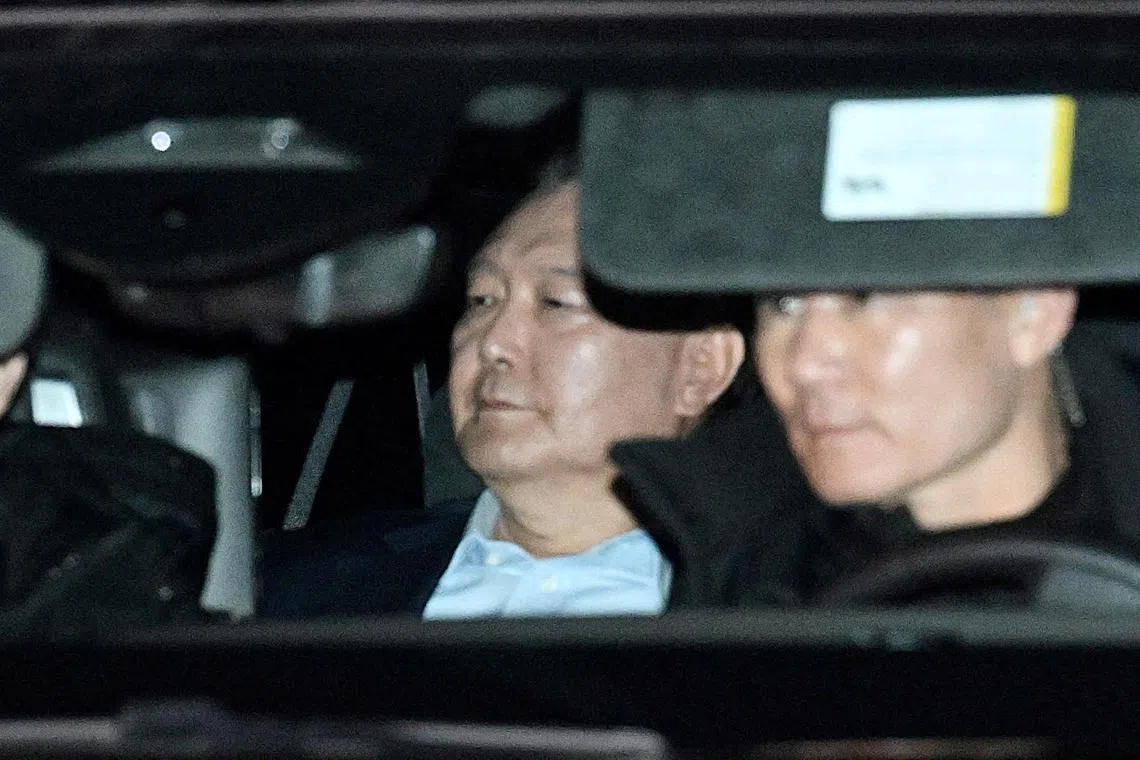Yoon continues to refuse questioning; visitors banned to prevent destruction of evidence
Sign up now: Get insights on Asia's fast-moving developments

South Korea’s suspended President Yoon Suk Yeol has been refusing questioning since he was taken into custody on Jan 15.
PHOTO: REUTERS
SEOUL - South Korea’s suspended President Yoon Suk Yeol was slapped with a visitor ban on Jan 19 and once again refused to be questioned by investigators on Jan 20.
He was placed under formal arrest early on Jan 19 on charges of leading an insurrection and committing abuse of power.
Mr Yoon’s legal representatives said “it will be difficult” for him to comply with the interrogation of the Corruption Investigation Office for High-ranking Officials (CIO), initially slated for 10am.
The arrested leader has been refusing questioning since he was taken into custody on Jan 15, staying silent during the 10-hour investigation that took place on the day he was taken into custody.
The Seoul Western District Court on Jan 19 issued another arrest warrant that will allow the authorities to detain Mr Yoon
Investigators have the right to hold Mr Yoon in custody for up to a total of 20 days from his first arrest on Jan 15 until the prosecution indicts him. The detention period could then be extended for up to six months until the court handling his criminal investigation reaches a verdict.
The CIO on Jan 19 banned Mr Yoon from having visits from anyone other than his lawyers, which officials said was a move to prevent the possible destruction of evidence. The risk of Mr Yoon destroying evidence has been cited by the court as one of the reasons for approving the warrant to arrest him.
With Mr Yoon’s continued silence and refusal to be questioned, which would take place at the CIO headquarters, possible options for the CIO include visiting him where he is being held in the Seoul Detention Centre or forcibly bringing him to the CIO headquarters for questioning.
The CIO, which has the authority to investigate the President, has agreed to split the 20-day detention period with prosecutors, who have the authority to file charges to indict Mr Yoon.
The prosecution is widely expected to indict the President around Feb 5, which is when his detention period is currently set to expire.
The expiration date for his detention period and the indictment could be pushed back if Mr Yoon’s lawyers mount a challenge to the arrest warrant in court, just as they did with the initial 48-hour arrest warrant. That challenge was not successful. If a court review on this particular case occurs, the time spent deliberating that would be added to Mr Yoon’s total detention period, meaning he could be in custody for longer before an indictment occurs.
Mr Yoon is being investigated for leading an alleged insurrection, giving what are believed to be illegal orders to his military and police officials after declaring martial law on Dec 3, 2024.
These orders include instructing Capital Defence Command chief Lee Jin-woo to forcibly arrest any lawmakers trying to get into Parliament on the night of Dec 3, 2024, telling him, “Break down the door and drag them out, shoot if you have to”, according to the prosecution
They also include sending a team backed up by 100 police officers and 20 escort vehicles to arrest a number of prominent political figures – including the heads of the ruling and main opposition parties and National Assembly Speaker – and outspoken opponents. THE KOREA HERALD/ASIA NEWS NETWORK


